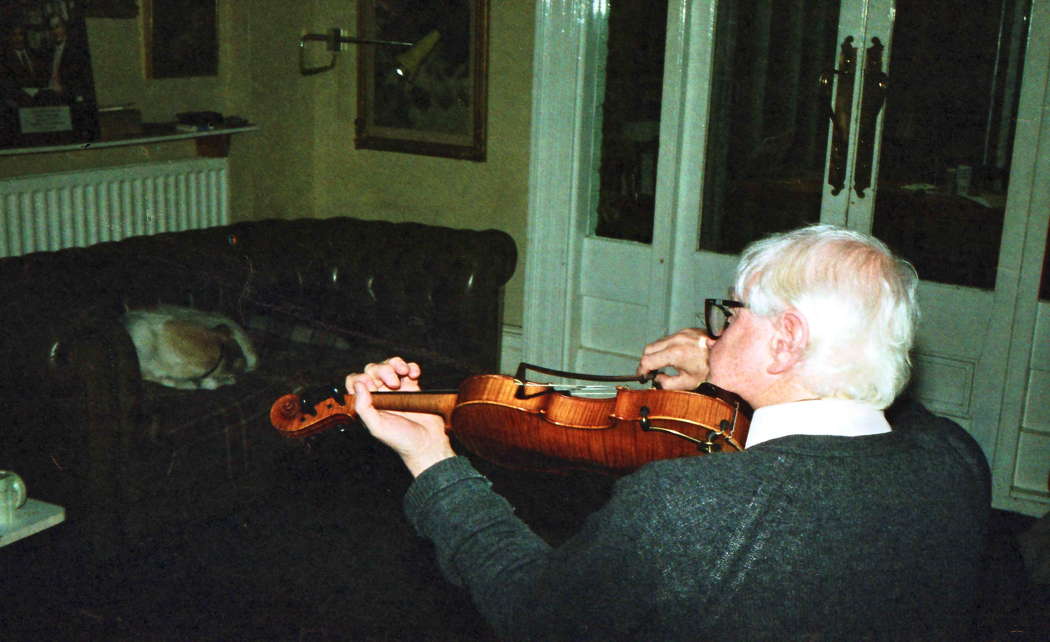- Rudolf Kempe
- Friedrich Schiller
- Ravello Festival
- Mendelssohn: A Midsummer Night's Dream
- Christopher Monk
- BBC Russia
- Alyssa Weinberg
- Madeira
George Balcombe
George Henry Balcombe was born in Brighton on 22 May 1927. He trained as an architect (later working on Brasilia and winning a RIBA Silver Medal for his essay on the same subject, and becoming one of Canada's youngest professors of architecture). His other interests included classical music, languages and dogs. With his partner, the writer Robin Bryans, Balcombe travelled extensively.
From the 1980s, when they moved to London, Balcombe played violin in various amateur orchestras and took up composition, later producing a wind dectet arrangement of Carnival of the Animals for Lawrence Leonard's wind group at Morley College. Balcombe and Bryans also ran a succession of musical houses, attracting established composers and performers from the London scene. From the mid-1980s George mentored Daniel Schorno, the grandson of an old Swiss friend, studying in London, who went on to become artistic director of STEIM in Amsterdam, and a significant composer.

George Balcombe (1927-2015) at his West Ealing home in the early 1990s, playing to a largely canine audience. Photo © Daniel Schorno
After Robin Bryans passed away in 2005, George Balcombe began to review CDs for Music & Vision, continuing until the onset of dementia in 2012 began to make writing difficult.
George Balcombe died in London on 9 January 2015, aged eighty-seven.
Articles by George Balcombe
The Goldberg Variations and The Art of Fugue. '... musical richness and instrumental knowledge ...'
Susanna Phillips sings Debussy, Messiaen and Fauré. '... Fauré knew how to make music live ...'
The Deller Consort performs Purcell. 'Alfred Deller is fantastic ...'
British Art Songs. '... a strong affinity ...'
George Balcombe dismisses Patrick Piggott's book about music in the life and writings of Jane Austen
J S Bach cello suites. '... brilliance and beauty ...'
Music by Pierre Moulu. '... magically moving individual lines and harmonies.'
Blomstedt conducts Brucker 4. '... playing magic ...'
A sepia album from World War I. '... intense emotion, beautifullly replicated ...'
Interpretations by Stephen Gutman. '... not a million miles away from jazz.'
Choral music from Latvia, Lithuania and Estonia. '... such clarity ...'
Works by Fauré for Cello and Piano. '... a profoundly moving sound ...'
Celebrating Lyrita's recordings of British music. '... a meticulous reproduction of orchestral sound ...'
A selection of Christmas music. '... an amazing collection.'
Music by J S Bach. '... a number of oddities ...'
Music from Venice. '... an amazing display of eighteen short pieces ...'
Music by Julius Röntgen and Per Nørgård. 'How could any audience resist ... ?'
Cantica Symphonia sing sixteenth century motets, and impress George Balcombe. '... so gentle yet precise ...'
Medieval music by Busnois, Domarto and Pullois. '... profoundly moving.'
A recording by The Brahms Trio Prague
British light music. '... a wasteland of clone music.'
English Songbooks of the 1700s. '... Baroque charms ...'
Romantic music for piano and orchestra
'An Alpine Symphony'. '... beguiling music.'
A book about Shostakovich
Music for violin and piano. '... clear and consistent ...'
Jabez Dolotz talks to British conductor Sir Henry Collard-Barker about experiences in and out of the concert hall
Music by Respighi and Mussorgsky. 'Tadaaki Otaka conjures the composer's unique sound ...'
Music by Sweelinck and his pupils. '... a brilliant performance ...'



